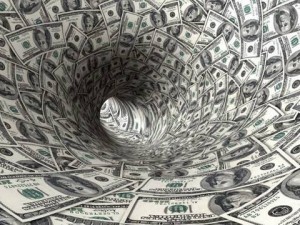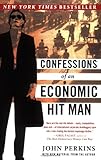by John Perkins
WASHINGTON -(Dow Jones)- World Bank President Robert Zoellick Thursday said he hopes the institution will have a role rebuilding Libya as it emerges from current unrest.
Zoellick at a panel discussion noted the bank’s early role in the reconstruction of France, Japan and other nations after World War II.
“Reconstruction now means (Ivory Coast), it means southern Sudan, it means Liberia, it means Sri Lanka, I hope it will mean Libya,” Zoellick said.
On Ivory Coast, Zoellick said he hoped that within “a couple weeks” the bank would move forward with “some hundred millions of dollars of emergency support.” (By Jeffrey Sparshott, Of DOW JONES NEWSWIRES –full article here – http://tinyurl.com/3hj8yyp.)
We listen to U.S. spokespeople try to explain why we’re suddenly now entangled in another Middle East war. Many of us find ourselves questioning the official justifications. We are aware that the true causes of our engagement are rarely discussed in the media or by our government.
While many of the rationalizations describe resources, especially oil, as the reasons why we should be in that country, there are also an increasing number of dissenting voices. For the most part, these revolve around Libya’s financial relationship with the World Bank, International Monetary Fund (IMF), the Bank for International Settlements (BIS), and multinational corporations.
 According to the IMF, Libya’s Central Bank is 100% state owned. The IMF estimates that the bank has nearly 144 tons of gold in its vaults. It is significant that in the months running up to the UN resolution that allowed the US and its allies to send troops into Libya, Muammar al-Qaddafi was openly advocating the creation of a new currency that would rival the dollar and the euro. In fact, he called upon African and Muslim nations to join an alliance that would make this new currency, the gold dinar, their primary form of money and foreign exchange. They would sell oil and other resources to the US and the rest of the world only for gold dinars.
According to the IMF, Libya’s Central Bank is 100% state owned. The IMF estimates that the bank has nearly 144 tons of gold in its vaults. It is significant that in the months running up to the UN resolution that allowed the US and its allies to send troops into Libya, Muammar al-Qaddafi was openly advocating the creation of a new currency that would rival the dollar and the euro. In fact, he called upon African and Muslim nations to join an alliance that would make this new currency, the gold dinar, their primary form of money and foreign exchange. They would sell oil and other resources to the US and the rest of the world only for gold dinars.
The US, the other G-8 countries, the World Bank, IMF, BIS, and multinational corporations do not look kindly on leaders who threaten their dominance over world currency markets or who appear to be moving away from the international banking system that favors the corporatocracy. Saddam Hussein had advocated policies similar to those expressed by Qaddafi shortly before the US sent troops into Iraq.
In my talks, I often find it necessary to remind audiences of a point that seems obvious to me but is misunderstood by so many: that the World Bank is not really a world bank at all; it is, rather a U. S. bank. Ditto, its closest sibling, the IMF. In fact, if one looks at the World Bank and IMF executive boards and the votes each member of the board has, one sees that the United States controls about 16 percent of the votes in the World Bank – (Compared with Japan at about 7%, the second largest member, China at 4.5%, Germany with 4.00%, and the United Kingdom and France with about 3.8% each), nearly 17% of the IMF votes (Compared with Japan and Germany at about 6% and UK and France at nearly 5%), and the US holds veto power over all major decisions. Furthermore, the United States President appoints the World Bank President.
So, we might ask ourselves: What happens when a “rogue” country threatens to bring the banking system that benefits the corporatocracy to its knees? What happens to an “empire” when it can no longer effectively be overtly imperialistic?
One definition of “Empire” (per my book The Secret History of the American Empire) states that an empire is a nation that dominates other nations by imposing its own currency on the lands under its control. The empire maintains a large standing military that is ready to protect the currency and the entire economic system that depends on it through extreme violence, if necessary. The ancient Romans did this. So did the Spanish and the British during their days of empire-building. Now, the US or, more to the point, the corporatocracy, is doing it and is determined to punish any individual who tries to stop them. Qaddafi is but the latest example.
Understanding the war against Quaddafi as a war in defense of empire is another step in the direction of helping us ask ourselves whether we want to continue along this path of empire-building. Or do we instead want to honor the democratic principles we are taught to believe are the foundations of our country?
History teaches that empires do not endure; they collapse or are overthrown. Wars ensue and another empire fills the vacuum. The past sends a compelling message. We must change. We cannot afford to watch history repeat itself.
Let us not allow this empire to collapse and be replaced by another. Instead, let us all vow to create a new consciousness. Let the grass-roots movements in the Middle East – fostered by the young who must live with the future and are fueled through social networks – inspire us to demand that our country, our financial institutions and the corporations that depend on us to buy their goods and services commit themselves to fashioning a world that is sustainable, just, peaceful, and prosperous for all.
We stand at the threshold. It is time for you and me to step across that threshold, to move out of the dark void of brutal exploitation and greed into the light of compassion and cooperation.

